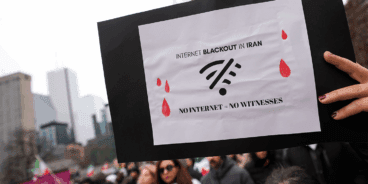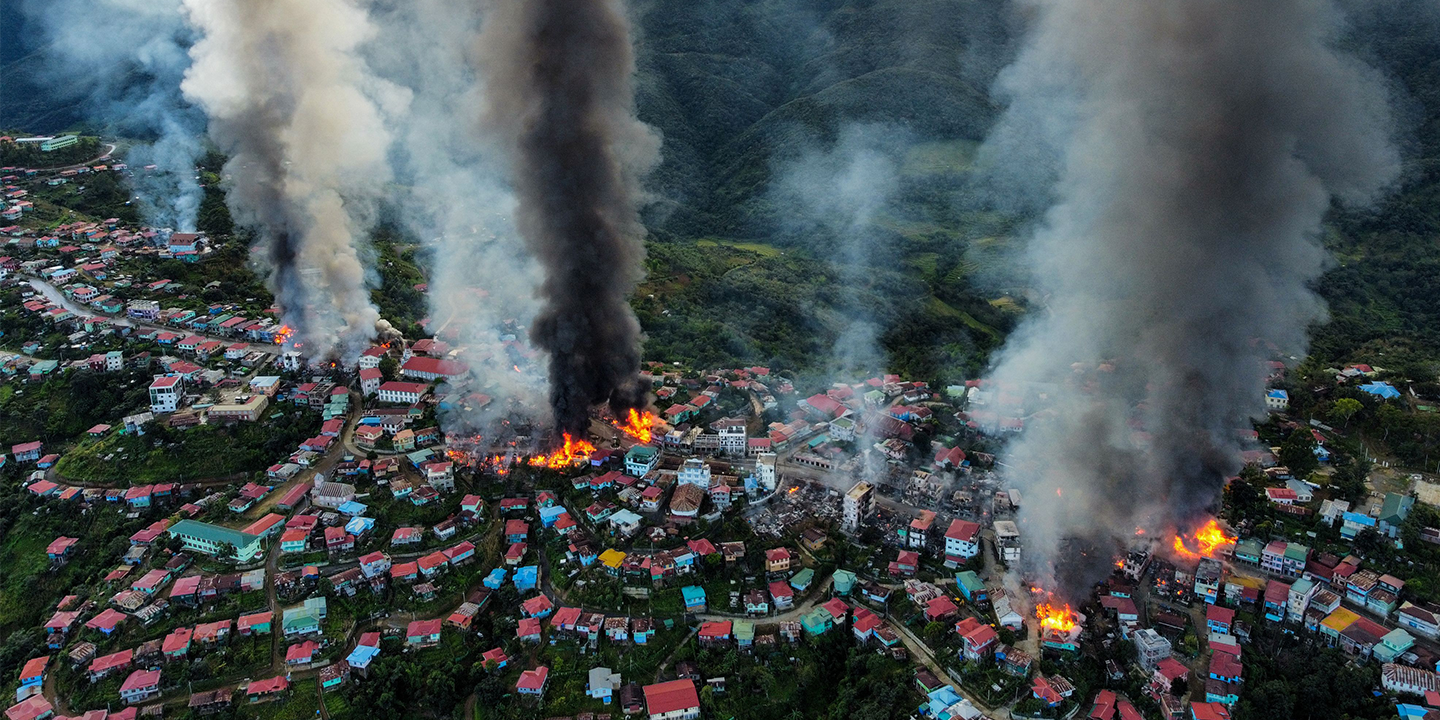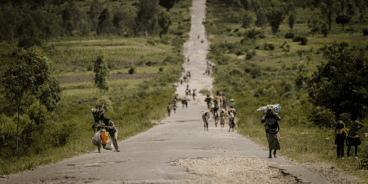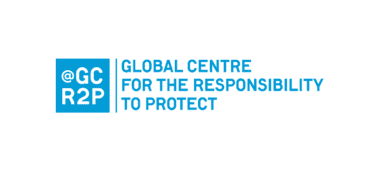

Atrocity Alert No. 277: Ethiopia, Myanmar (Burma) and Climate Change
Atrocity Alert is a weekly publication by the Global Centre for the Responsibility to Protect highlighting situations where populations are at risk of, or are enduring, mass atrocity crimes.
ETHIOPIAN GOVERNMENT CALLS ON CIVILIANS TO ARM AS TIGRAYAN FORCES GAIN TERRITORY
On 2 November the Ethiopian federal government declared a nationwide state of emergency in response to the possible southward advance by Tigrayan forces towards the capital, Addis Ababa. Reports emerged on 31 October and 1 November that the Tigrayan Defense Forces (TDF) captured an additional two towns in the Amhara region, marking a significant territorial gain in the year-long war against the federal government. The TDF have joined up with fighters from the allied Oromo Liberation Army (OLA), a rebel armed group that is seeking self-determination for the Oromo people, Ethiopia’s largest ethnic group. The OLA has reportedly captured the town of Kemise, located 200 miles northeast of Addis Ababa.
Officials in Addis Ababa have urged civilians to arm themselves and prepare to defend their neighborhoods. Prime Minister Abiy Ahmed also called on civilians to use “any type of weapon” available, asserting that “dying for Ethiopia is a duty for all of us.”
The city administration in Addis Ababa stated they were conducting “house-to-house searches” for “troublemakers” and announced their intention to take legal measures against residents who were found to be “supporters” of or “nostalgic for” the Tigray People’s Liberation Front, the regional governing party of Tigray and aligned with the TDF. Authorities in the city previously conducted ethnically motivated detention campaigns against Tigrayans in June and July.
This latest escalation comes as the conflict in Tigray reaches the one-year mark. Thousands of people have been killed and more than 7 million in Tigray, Amhara and Afar remain in desperate need of aid. Earlier today, 3 November, the Office of the UN High Commissioner for Human Rights and the Ethiopian Human Rights Commission released a joint report finding that all parties to the conflict – including Tigrayan forces and federal government forces, as well as their Eritrean and militia allies – have committed violations of international law that may amount to war crimes and crimes against humanity.
Savita Pawnday, Executive Director of the Global Centre for the Responsibility to Protect, said that, “in a conflict that has already been characterized by ethnically polarizing hate speech and incitement by political leaders, the call to arms and house-to-house searches in Addis Ababa are concerning developments. The UN Security Council and African Union must strongly urge the government of Ethiopia and all other parties to the conflict to agree to an urgent ceasefire to prevent any further escalation.”
MYANMAR MILITARY PERPETRATES SCORCHED-EARTH CAMPAIGN IN CHIN STATE
On 29 October soldiers razed more than 200 homes and other buildings in Thantlang, Chin State, as part of the military’s ongoing offensive against pro-democracy militias in upper Myanmar (Burma). Following a confrontation with the Chinland Defense Force, a local self-defense militia, Myanmar’s military — the Tatmadaw — began shelling Thantlang. After the shelling, soldiers reportedly entered the town, torching buildings at random. Two Christian churches and a local Save the Children office were among the buildings destroyed in the attack. The majority of the town’s population – approximately 10,000 people – had already fled Thantlang following a similar attack on 18 September during which the military razed 19 buildings.
In response to their office being destroyed, Save the Children stated that, “the destruction caused by this violence is utterly senseless. Not only has it damaged one of our offices, it risks destroying the whole town and the homes of thousands of families and children… Many will now have lost what little they had left, and will have no homes to return to, adding to the numbers of long-term displaced people across Myanmar and its borders.”
The latest incident in Thantlang is the largest offensive the Tatmadaw has perpetrated in upper Myanmar since early October. The attack bears sharp resemblance to the clearance operations the Tatmadaw perpetrated against the Rohingya in Rakhine State in 2017. According to the Chin Human Rights Organization, while troops were en route to Thantlang, they torched four villages in Falam township. Large numbers of troops have been stationed in Hakha, Mindat, Kanpetlet and Falam townships of upper Myanmar, raising concerns of further scorched-earth campaigns, which may amount to crimes against humanity. The Tatmadaw has historically persecuted the population of Chin State, which is over 90 percent Christian.
On 1 November Tom Andrews, the UN Special Rapporteur on the situation of human rights in Myanmar, emphasized that, “the torching of Thantlang, following heavy deployment of troops and artillery in Chin State, is another reason why the UN Security Council needs to convene to act now and stop the flow of revenue and weapons the junta needs to continue its assault of the Myanmar people.” The UN Security Council should uphold its responsibility to protect the people of Myanmar, including by immediately imposing targeted sanctions and an arms embargo, and calling for an independent, international investigation into the attack on Thantlang.
COP26: THE CLIMATE CRISIS AND THE RESPONSIBILITY TO PROTECT
On 31 October the 26th annual Conference of the Parties – also known as COP26, the United Nations climate change conference – began in Glasgow, Scotland, bringing together world leaders for crucial climate crisis discussions.
Populations living in conflict-affected countries are among the most vulnerable to today’s climate crisis. UN Secretary-General António Guterres previously said that, “unless we protect those most exposed and susceptible to climate-related impacts, we can expect them to become even more marginalized, and their grievances to be reinforced.”
Climate change has been recognized as a “threat multiplier” for conflict and mass atrocities because of its potential to exacerbate existing threats. The crises and challenges arising from climate change – including the dramatic widening of inequality caused by climate emergencies, resource scarcity, environmental degradation and the political manipulation of access to precious resources – all pose a threat to vulnerable societies, creating an environment conducive to the commission of atrocities.
The UN has called the Sahel a “hotspot of climate change” due to rising temperatures, droughts and destructive floods. The increase in violence and atrocities across the Central Sahel –Burkina Faso, Mali and Niger – adds another risk to populations who are already vulnerable to the effects of climate change. People have been forced to leave their fields and livelihoods, putting pressure on host communities and increasing tensions between groups. More than 6.5 million people in the region are severely food insecure and 2.1 million have been internally displaced by violence in recent years.
In many parts of the world, there is often an overlap between communal identities and agrarian or pastoralist groups, enabling resource-based disputes to devolve into inter-communal conflict. In Nigeria, for example, growing desertification has resulted in loss of grazing land in the north-east, driving many ethnic Fulani herdsmen, who are mainly Muslim, southward into areas farmed by settled communities that are predominately Christian. This has led to widespread inter-communal tensions and deadly violence in the “Middle Belt” and other parts of Nigeria in recent years.
Further, armed extremist groups have also been emboldened by climate related insecurities. Boko Haram, for example, has exploited the impact of climate change in north-east Nigeria to recruit fighters and seize territory abandoned by populations forced to migrate due the impact of the shrinking of Lake Chad. In central Mali, Islamist armed groups like Katiba Macina have exploited issues that are exacerbated by climate hazards, such as land rights and social equality for herders, to build local support and recruit fighters.
While world leaders are gathered at COP26, they must not forget the communities living through conflict, atrocities and climate change. States should do more to uphold their collective responsibility to protect vulnerable populations from atrocities, including those exacerbated by climate emergencies. Failure to consider the many ways climate change threatens populations will undermine the protection of civilians, conflict prevention and sustainable peace.
Related Content


